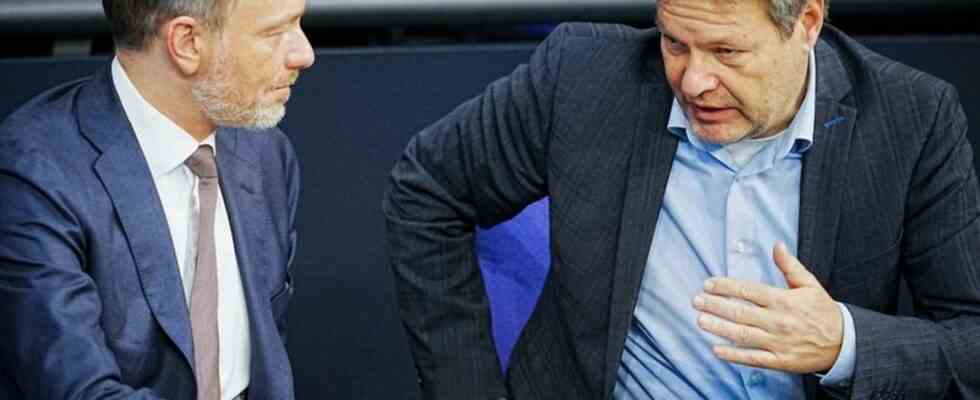It is said that friendship ends with money. It’s no different in the federal government. After the Berlin election, the tone becomes more irritated. The financial scope is limited.
A dispute over the direction of budgetary policy has broken out in the traffic light coalition. In the course of drawing up the 2024 budget, Economics Minister Robert Habeck (Greens) and Finance Minister Christian Lindner (FDP) clashed violently. The core question is whether and how more income can be generated and which projects should have priority. The departments have additional requests worth billions.
Habeck asked Lindner in a letter on behalf of the ministries led by the Greens “not to make any further public or internal preliminary determinations that unilaterally prioritize further expenditure”. The stock pension, the sales tax reduction for the catering trade and the German Armed Forces are mentioned as examples. The rules for compliance with the debt brake have been agreed and are not being questioned by the Greens.
“However, other political projects were also agreed, which are by no means subordinate to compliance with the debt brake,” said Habeck. “In this respect, we are all challenged to find new and alternative ways in which these goals can be achieved while complying with the stipulation you have set for a 2024 budget that complies with the debt brake. Since there are no proposals on the table yet, we can Also don’t accept benchmarks.”
Environmentally harmful subsidies under scrutiny
The Vice-Chancellor suggests discussing “how we can improve revenues, promote the reduction of environmentally harmful subsidies and identify programs that can be replaced by regulatory law”.
“Regulatory law” means nothing other than bans – for example for measures to save CO2. For the FDP, however, “regulatory law” is an emotive word. There has also been a long-standing dispute about how and whether environmentally harmful subsidies should be phased out. The Greens want a reform of the so-called tax company car privilege, which the FDP rejects.
Lindner reacted coolly. In his reply to Habecks, he said he was “surprised” by the news that the green ministries no longer accepted the benchmarks for the 2024 federal budget.
These key figures were agreed in March 2022, and negotiations are currently underway on the update and the 2024 budget. This provides for an upper limit of around 424 billion euros.
Lindner excludes additional tax burdens
Regarding Habeck’s proposal for “income improvements”, Lindner writes: “I do not want to take up this suggestion. On behalf of the ministries led by the Free Democrats, I can state that tax increases or other structural additional burdens for the citizens or the economy are excluded from the coalition agreement. “
The exchange of the two ministers comes a few days after the Berlin elections, in which the FDP was kicked out of the House of Representatives. The Greens were the third strongest force, just behind the SPD. After the election, Lindner said that the FDP was a “guarantor” for center politics in the traffic light coalition.
Lindner’s guidelines for the federal budget are clear: no tax increases and strict compliance with the debt brake enshrined in the Basic Law, which only allows the federal government to take out new loans to a limited extent.
Lindner insists on the debt brake
In his reply to Habeck’s letter, he said he was “relieved” that the ministries led by the Greens did not question the Basic Law. “However, the political plans of the coalition agreement are constitutionally subordinate to compliance with the Basic Law. The debt brake anchored there is also economically wise in view of the increased interest burden for the state.” Lindner has also often referred to a significant increase in interest payments.
This limits the financial scope. FDP parliamentary group deputy Christoph Meyer said on Thursday in the direction of Habeck that budget expenditure should be prioritized and clearly consolidated.
According to information from the “Handelsblatt”, however, the additional wishes of the federal ministries in the budget negotiations for the next year alone add up to almost 70 billion euros. This was confirmed to the dpa from circles in the Ministry of Finance. The wishes are “absolutely unfulfillable,” according to the newspaper in the Ministry of Finance. If individual ministers wanted to spend more, the money would have to be saved elsewhere.
There is also disagreement about stock pensions
This is aimed at Defense Minister Boris Pistorius (SPD), for example. In addition to the €100 billion special pot set up last year for the 2024 budget and the budgets for the following years, he wants an additional ten billion euros for the defense budget.
The financing of basic child security also seems unclear – a prestige project above all for the Greens and SPD. There are different opinions on stock pensions. A capital stock is to be built up to secure pensions in the long term, for which the SPD, Greens and FDP have announced ten billion euros in the coalition agreement. The FDP now wants permanent growth, which the Greens are skeptical about.
Lindner himself has spoken out in favor of reducing the burden on the economy and has announced a “tax growth package”. That could also cause a dispute in the coalition – as well as a permanent reduction in the reduced VAT rate on food in the catering trade. The rate was reduced from 19 to 7 percent during the corona pandemic and was last extended until the end of 2023. A spokesman for Lindner recently told the “Lebensmittel Zeitung” that the minister was open to a discussion about an unlimited application of the regulation – the Greens are skeptical.

